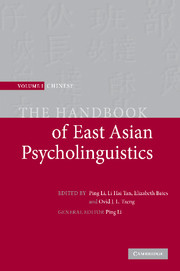Book contents
- Frontmatter
- Contents
- List of figures
- Notes on contributors
- Preface
- Introduction: new frontiers in Chinese psycholinguistics
- Part I Language acquisition
- 1 Actions and results in the acquisition of Cantonese verbs
- 2 Chinese children's knowledge of the Binding Principles
- 3 Chinese classifiers: their use and acquisition
- 4 Child language acquisition of temporality in Mandarin Chinese
- 5 Second language acquisition by native Chinese speakers
- 6 Making explicit children's implicit epilanguage in learning to read Chinese
- 7 Emergent literacy skills in Chinese
- 8 Basic syntactic categories in early language development
- 9 Growth of orthography-phonology knowledge in the Chinese writing system
- 10 Interaction of biological and environmental factors in phonological learning
- 11 The importance of verbs in Chinese
- 12 Grammar acquisition via parameter setting
- 13 Early bilingual acquisition in the Chinese context
- Part II Language processing
- Part III Language and the brain
- Epilogue: a tribute to Elizabeth Bates
- References
- Name index
- Subject index
11 - The importance of verbs in Chinese
Published online by Cambridge University Press: 05 June 2012
- Frontmatter
- Contents
- List of figures
- Notes on contributors
- Preface
- Introduction: new frontiers in Chinese psycholinguistics
- Part I Language acquisition
- 1 Actions and results in the acquisition of Cantonese verbs
- 2 Chinese children's knowledge of the Binding Principles
- 3 Chinese classifiers: their use and acquisition
- 4 Child language acquisition of temporality in Mandarin Chinese
- 5 Second language acquisition by native Chinese speakers
- 6 Making explicit children's implicit epilanguage in learning to read Chinese
- 7 Emergent literacy skills in Chinese
- 8 Basic syntactic categories in early language development
- 9 Growth of orthography-phonology knowledge in the Chinese writing system
- 10 Interaction of biological and environmental factors in phonological learning
- 11 The importance of verbs in Chinese
- 12 Grammar acquisition via parameter setting
- 13 Early bilingual acquisition in the Chinese context
- Part II Language processing
- Part III Language and the brain
- Epilogue: a tribute to Elizabeth Bates
- References
- Name index
- Subject index
Summary
Overview
This chapter presents a summary of differences in the extent to which English- and Chinese- (Mandarin and Cantonese) speaking children and adults use nouns and verbs in their everyday speech. Specifically, it demonstrates that both child and adult speakers of Chinese use a much larger proportion of verbs in their speech than any data or models based on English would have predicted. In order to account for these findings, it also discusses some relevant structural differences between nouns and verbs in these languages as well as the importance of these differences when designing language tests and stimuli for Chinese. These differences also have significant implications for theoretical models of language development and other processes.
Children's early words: the importance of verbs in Chinese
Over the past decade, several studies of Mandarin- and Cantonese-speaking children's early vocabulary development have provided converging evidence for the fact that Chinese-speaking children's vocabularies have a very different proportion of nouns and verbs than comparable samples of English speakers and speakers of most other languages, except perhaps Korean (see Au, Dapretto & Song, 1994; Choi, 2000; Choi & Gopnik, 1995; Kim, McGregor & Thompson, 2000). Moreover, although individual child characteristics, activity context, and measurement instruments all have significant effects on the extent to which a child's vocabulary may appear to contain nouns or verbs, every context and instrument in which Chinese- and English-speaking children's vocabularies has been compared directly has yielded reliable and highly significant differences.
- Type
- Chapter
- Information
- The Handbook of East Asian Psycholinguistics , pp. 124 - 135Publisher: Cambridge University PressPrint publication year: 2006
- 5
- Cited by



